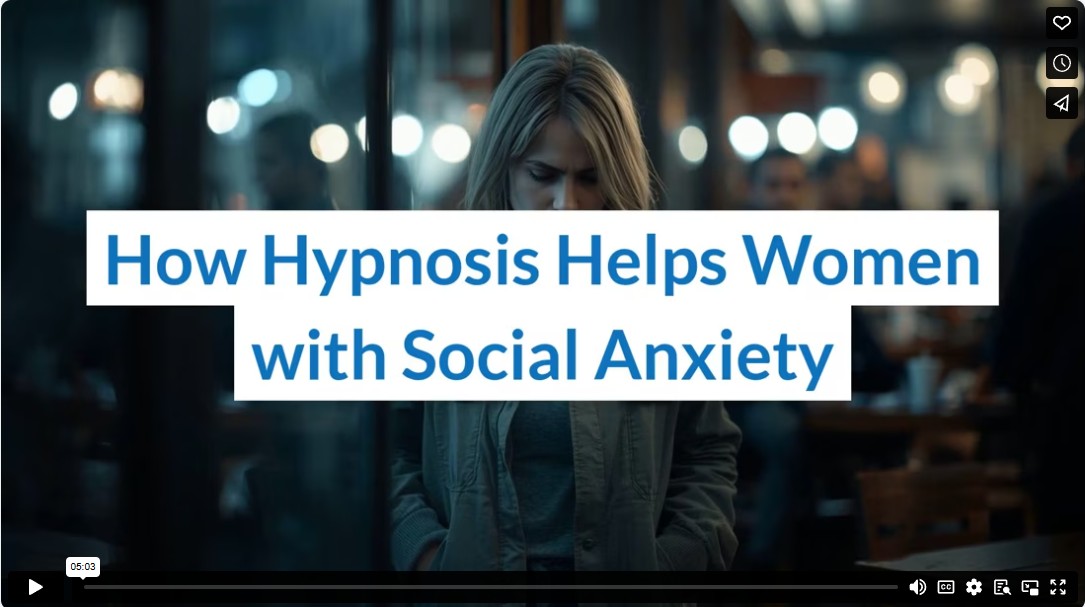Social anxiety is a deeply personal—yet incredibly common—experience. While it can affect anyone, women tend to experience it more often and more intensely. But why?
Part of it comes down to socialization. From a young age, you may have been conditioned to be “nice,” “polite,” or “not too much.” You might’ve learned to second-guess yourself or apologize for taking up space. These messages sink in early, and they shape how you show up in all facets of life: conversations with other adults, friendships, at work—even in romantic relationships.
If you’ve ever walked away from a conversation replaying every word you said (or didn’t say), you’ve already felt the weight of this pressure. But social anxiety is more than just about being shy. It’s a persistent fear of being judged or embarrassed. And that fear lives deep in your subconscious patterns.
Here’s what you should know about social anxiety and how hypnosis can help.
The Hidden Triggers Behind Your Anxiety
You might think your anxiety only shows up in obvious places, like speaking in a meeting or introducing yourself at a party. But its roots go deeper. For many women, social anxiety is tied to:
- Perfectionism: You feel like you must say the “right” thing every time.
- Fear of judgment: You assume people scrutinize your words or body language.
- People-pleasing: You downplay your opinions to avoid conflict or discomfort.
- Past experiences: A memory of being embarrassed or shut down in childhood still lingers in your mind.
These patterns often become automatic. Even when you rationally know you’re in a safe environment, your body responds with tension, and your voice might tighten or vanish altogether.
Why Traditional Methods Aren’t Enough
Therapy, journaling, and mindset coaching all have their place. But if you’ve tried these routes and still feel stuck, it’s because these conventional methods primarily address your social anxiety at the conscious level—where logic and language live. The problem? Social anxiety often doesn’t start there. It begins in the subconscious, in the emotional and survival parts of your brain. That’s exactly where hypnosis treatment comes in.
How Hypnosis Works on the Subconscious Mind
Hypnosis is a natural, focused state of awareness, like being fully absorbed in a book or movie. You’re not asleep or unconscious. Instead, you’re deeply relaxed and more connected to your internal thoughts, emotions, and imagination.
During hypnosis, your subconscious mind becomes more open to new suggestions and less guarded by the fears and doubts of the conscious mind. That means you’re able to:
- Release outdated emotional responses
- Create new associations with confidence
- Practice social situations in your mind while feeling calm and in control
- Rewire the automatic reactions that make social anxiety feel so overpowering
Unlike traditional therapy, this process doesn’t rely on overanalyzing your past. Instead, it focuses on making changes in the present in order to feel different in the future.
What Makes Hypnosis Especially Effective for Women
Women often carry layered emotional burdens. You may have learned to prioritize others’ comfort over your own, anticipate other people’s reactions, or manage your energy based on who’s in the room. That kind of emotional multitasking is exhausting, and it can feed anxiety without you even noticing.
Hypnosis helps you develop a clearer sense of boundaries and authentic presence. Instead of shrinking in social situations or playing small, you will feel grounded.
You also get to reprogram how you view yourself socially. Instead of assuming you’re being judged, you begin to feel like you belong. And that shift from hyper-vigilance to inner confidence changes everything.
What to Expect from a Hypnosis Session for Social Anxiety
The process is more comfortable than you might think. You won’t be asked to relive traumatic memories or disclose things you’re not ready to share. Sessions are collaborative and tailored to what you want to shift.
Typically, a session includes:
- Initial discussion: You’ll talk with the hypnotherapist about your goals and what success looks like for you.
- Guided induction: The hypnotherapist will lead you into a state of relaxation where your attention turns inward. You’ll still hear everything and remain in control, but your body will feel calm and grounded.
- Subconscious work: Throughout your session, the hypnotherapist may use positive suggestions and imagery to help your brain form new associations. They will help you visualize yourself feeling confident in situations that are normally triggering.
- Debrief and integration: You’ll be guided out of the state of hypnosis and become fully aware of your surroundings. After just one session, you may even find that you’ve overcome this limiting belief.
Healing Social Anxiety Starts from Within
You don’t have to keep dreading group chats or rehearsing conversations in your head for hours. And you don’t need to live in a constant state of self-monitoring, either.
Hypnosis helps you interrupt the patterns that no longer serve you. It shows your nervous system what safety feels like and gives your subconscious permission to relax in social spaces. With it, you’ll be better equipped to show up as your best self and say goodbye to social anxiety for good.
Video
Infographic
Social anxiety affects many women, often intensified by perfectionism, fear of judgment, and past experiences. This infographic explores how hypnosis can ease anxiety by rewiring thought patterns, boosting confidence, and promoting emotional healing.


